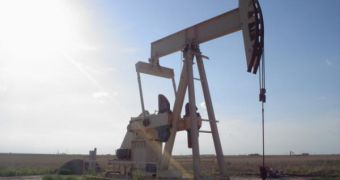Despite the fact that oil is the “engine” of modern economy, few people know how it's made, deep down inside the ground, under intense pressure. Not even scientists are exactly sure what materials existed deep in the crust before oil started forming, although some agree that tiny microorganisms that lived several millions of years ago were probably the ones responsible for initiating the transformation. But the exact process is still a mystery, and now some researchers have taken it upon themselves to learn this process.
Most of the scientific community nowadays believes that the oil that currently keeps the world moving is actually derived from the remains of marine animals, such as plankton and algae, which got trapped in certain areas of the globe, after the seas receded. Over time, they were covered in thick layers of rocks, which then started pressing very hard on them, creating immense pressure. Some scientists say that petroleum is actually derived from lipids, the fat molecules inside any living creature.
They maintain that the chemical analyses of numerous oil samples have revealed that the substance has in it lipids whose structure closely resembles that found in bacterial cell membrane. They believe that this makes sense, and propose a model to explain how petroleum came to be. It holds that, while bacteria usually recycle dead cells in the oceans, they tend not to eat the lipids, on account of the fact that they are very hard to “chew” and bring little in terms of nourishment.
So, most often, these fat cells drop to the ocean floor, where they are eventually covered by layers of sediment, over millions of years of evolution. In the end, they clog up together to form the huge oil fields that petroleum companies are nowadays so desperately looking for. “There is a lot of evidence to support the biogenic origin. Some of the petroleum molecules, for example, resemble the lipids found in bacterial cell membranes,” Arizona State University (ASU) biogeochemist Everett Shock tells LiveScience.
Experiments designed to allow scientists to understand exactly how oil is formed may take up to 10 or 100 million years, so it's perfectly understandable that no one has the time to wait for it to complete. However, people absolutely need to get a better view of how the stuff is formed, so as to be able to replicate it once natural reserves are gone. “It's rather remarkable that we are so dependent on oil, and yet we really don't understand how it is made in all its gory details,” Shock concludes.

 14 DAY TRIAL //
14 DAY TRIAL //